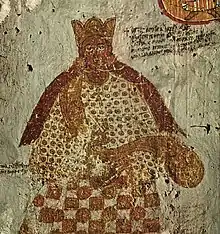ūru
See also: Appendix:Variations of "uru"
Nobiin

Nubian king Moses George of Makuria
Etymology
From Old Nubian ⲟⲩⲣⲟⲩ.
References
- Browne, Gerald M. (1996) Old Nubian Dictionary, University of Virginia: In Aedibus Peeters, →ISBN, page 140
Pali
Alternative forms
Alternative forms
- 𑀊𑀭𑀼 (Brahmi script)
- ऊरु (Devanagari script)
- ঊরু (Bengali script)
- ඌරු (Sinhalese script)
- ဦရု or ဥုရု or ဢူရု (Burmese script)
- อูรุ (Thai script)
- ᩐᩁᩩ (Tai Tham script)
- ອູຣຸ (Lao script)
- ឨរុ (Khmer script)
- 𑄃𑄫𑄢𑄪 (Chakma script)
Declension
Declension table of "ūru" (masculine)
| Case \ Number | Singular | Plural |
|---|---|---|
| Nominative (first) | ūru | ūravo or ūrū |
| Accusative (second) | ūruṃ | ūravo or ūrū |
| Instrumental (third) | ūrunā | ūrūhi or ūrūbhi |
| Dative (fourth) | ūrussa or ūruno | ūrūnaṃ |
| Ablative (fifth) | ūrusmā or ūrumhā | ūrūhi or ūrūbhi |
| Genitive (sixth) | ūrussa or ūruno | ūrūnaṃ |
| Locative (seventh) | ūrusmiṃ or ūrumhi | ūrūsu |
| Vocative (calling) | ūru | ūrave or ūravo |
Synonyms
References
- Pali Text Society (1921-1925), “ūru”, in Pali-English Dictionary, London: Chipstead
- Childers, Robert Caesar, Dictionary of the Päli language, London: Trübner & Company, 1875, page 537.
This article is issued from Wiktionary. The text is licensed under Creative Commons - Attribution - Sharealike. Additional terms may apply for the media files.